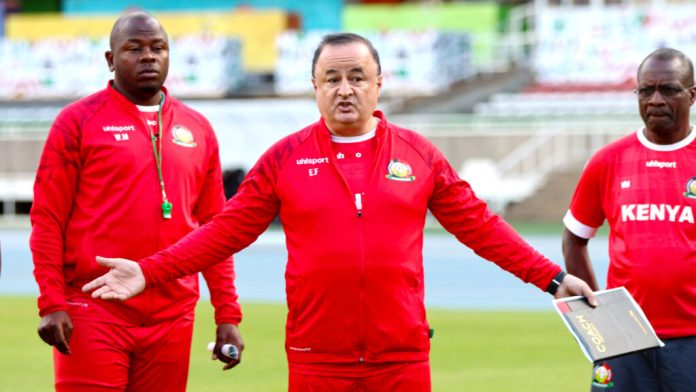Sports Cabinet Secretary Kipchumba Murkomen has delivered a strong message regarding the future of Harambee Stars head coach Engin Firat, following Kenya’s failure to qualify for the 2025 Africa Cup of Nations (AFCON). Speaking on Monday night, Murkomen insisted that Firat’s tenure should end, citing his inability to meet the terms of his contract, which required qualification for the continental tournament.
Murkomen’s statement not only places pressure on the new Football Kenya Federation (FKF) leadership under Hussein Mohammed but also raises questions about the financial and managerial decisions that have shaped Kenyan football in recent years.
Government Withdrawal of Financial Support
Murkomen made it clear that should FKF choose to retain Firat, the government would no longer fund his salary. This marks a significant policy shift, as Firat’s remuneration has historically been covered by taxpayers’ money.
“I’ve seen the contract of the Harambee Stars coach—it clearly states that if he doesn’t qualify for AFCON, he should exit,” Murkomen said during an interview with NTV. “If FKF wants to keep him, they must pay his salary with their own resources.”
This stern position underscores the government’s dissatisfaction with Firat’s performance and signals a desire to see more accountability in FKF’s decision-making processes.
A Disappointing Tenure
Engin Firat’s tenure as Harambee Stars coach has been marred by underwhelming results. Hired in 2021 under controversial circumstances, Firat has managed only three competitive victories in his three years at the helm. His failure to guide Kenya to the 2025 AFCON has amplified calls for his dismissal, with critics questioning both his credentials and the process behind his hiring.
State of Kenyan Sports
CS Murkomen: It is strange and unfortunate that a foreigner sitting somewhere in CAF is very positive about Kenya’s capacity and ability to achieve this tournament, but we as Kenyans are doing everything possible to sponsor propaganda. Let’s be positive.… pic.twitter.com/mnCCBTFhXp
— NTV Kenya (@ntvkenya) December 9, 2024
Murkomen was particularly scathing in his criticism, pointing out Firat’s lack of a proven track record. “I don’t know what criteria Nick Mwendwa used to hire him. He didn’t have a noteworthy history of success, and yet his salary is paid by taxpayers, which is highly unusual,” Murkomen said.
FKF’s Role and Responsibility
While the government cannot directly fire Firat due to legal constraints, Murkomen emphasized that the decision ultimately lies with FKF. Under Kenyan law, the hiring and firing of national team coaches fall exclusively under the federation’s purview. However, the government’s withdrawal of financial support could force FKF’s hand in making a decision about Firat’s future.
The new FKF President Hussein Mohammed and his administration face a critical challenge in addressing this issue. Firat’s dismissal could lead to financial and legal complications if not handled carefully, as previous leadership experienced in 2016 when the dismissal of coach Adel Amrouche resulted in a costly FIFA dispute.
Learning from Past Mistakes
Murkomen’s warnings highlight the importance of avoiding a repeat of past mismanagement. In 2016, Nick Mwendwa’s FKF administration dismissed Adel Amrouche without following proper procedures, resulting in a FIFA ruling that required Kenya to pay the coach millions in compensation.
To avoid similar pitfalls, Hussein Mohammed’s leadership must ensure that any decision regarding Firat is both legally sound and aligned with the long-term goals of Kenyan football.
Criticism of Firat’s Appointment
Firat’s appointment in 2021 was controversial from the outset. As a former Moldova national team coach, his credentials were heavily scrutinized. Critics argued that his previous coaching record offered little indication that he could elevate Kenya’s footballing fortunes.
Murkomen echoed these sentiments, questioning the criteria used to hire Firat. “His hiring did not inspire confidence, and his results have validated those concerns,” Murkomen said.
What Lies Ahead for FKF?
The new FKF administration is tasked with steering Kenyan football out of its current struggles, and the future of the national team coach will be an immediate test of their leadership. Should they opt to retain Firat, FKF will need to secure alternative funding for his salary. On the other hand, dismissing Firat would require navigating potential legal and financial consequences.
Beyond the coach’s position, FKF must focus on rebuilding trust among players, fans, and stakeholders. Hussein Mohammed’s leadership has pledged to bring transparency and accountability to the federation, and decisions like this will be a litmus test for his administration.
Rebuilding Harambee Stars
Kenyan football faces broader challenges that go beyond the national team’s coaching situation. Lack of infrastructure, inadequate grassroots programs, and governance issues have hindered the growth of the sport. The failure to qualify for AFCON 2025 is symptomatic of deeper systemic problems that require long-term solutions.
Hussein Mohammed’s administration must prioritize:
- Improved Talent Development: Investing in youth programs and academies to build a pipeline of skilled players.
- Enhanced Governance: Implementing transparent processes for hiring and managing coaches.
- Securing Sponsorships: Reducing reliance on government funding by attracting private sector partnerships.
- Performance Standards: Establishing clear expectations and accountability measures for national team staff.
The Road Ahead
The decision regarding Engin Firat’s future will set the tone for FKF’s new leadership under Hussein Mohammed. While Murkomen’s remarks have intensified the pressure, they also highlight the urgency of reforms needed to elevate Kenyan football.
As the federation navigates this complex issue, it must strike a balance between immediate results and sustainable development. The Harambee Stars’ failure to qualify for AFCON 2025 is a setback, but with the right leadership and strategic decisions, Kenyan football can chart a course toward a brighter future.
RELATED ARTICLES:


